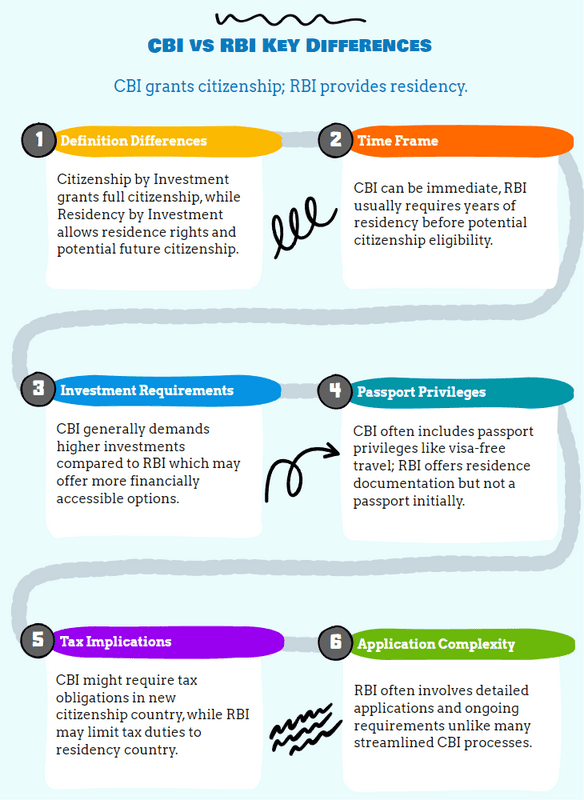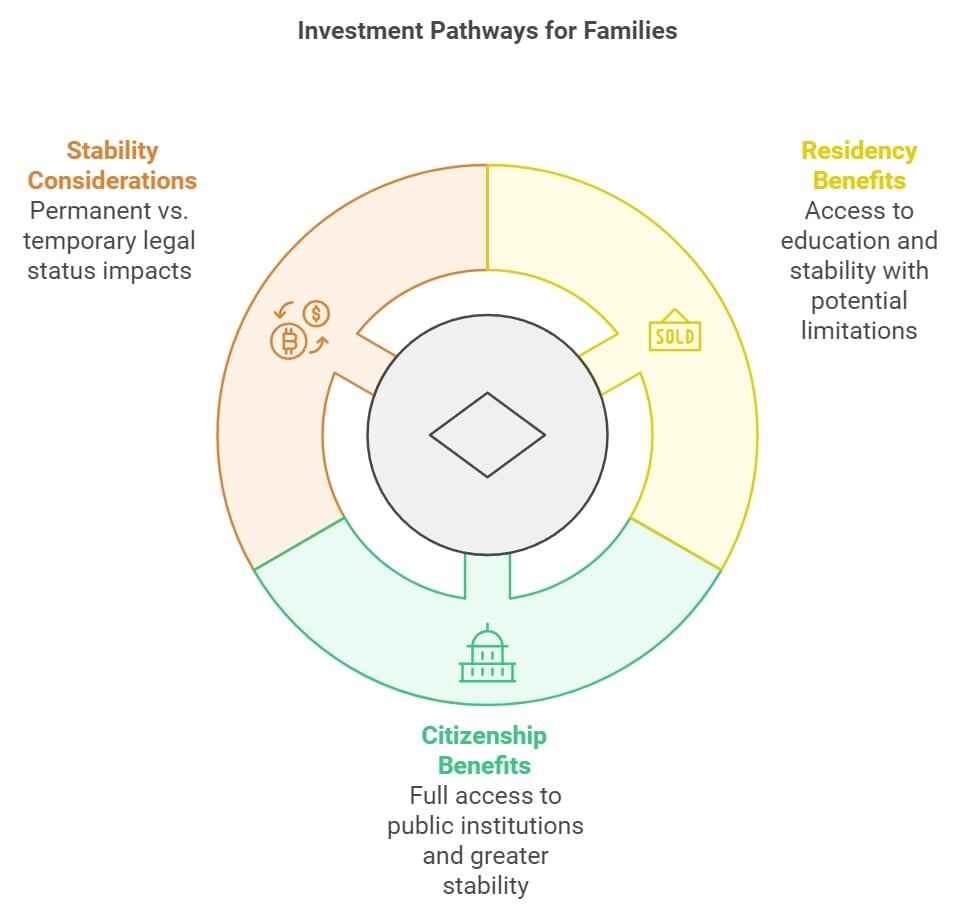Comparing Citizenship by Investment with Residency by Investment
Boost Your Freedom Without Compromise.
- Who offers the CHEAPEST program available.
- Who offers the BEST program available.
- What you need to qualify?

- Citizenship by investment (CBI) grants immediate citizenship and a passport upon significant economic contributions, while residency by investment (RBI) offers residency status, potentially leading to citizenship over time.
- Permanent residency obtained through investment may lead to citizenship, subject to residency duration, language proficiency, and integration requirements.
- It offers full citizenship rights, including voting and passport benefits, more quickly than RBI, which initially grants the right to reside, work, or study.
- Converting RBI to citizenship typically requires fulfilling residency requirements, demonstrating ties to the country, and often passing language and citizenship tests.
- It provides immediate travel benefits with visa-free or visa-on-arrival access to many countries, whereas RBI benefits grow as residency progresses towards citizenship.
Are you weighing up the benefits of citizenship by investment versus residency by investment?
If you're considering moving to a foreign country, investing in a citizenship or residency program can be an effective way to gain legal status and access to new opportunities.
However, the decision between citizenship by investment and residency by investment requires careful consideration of various factors.
In This Article, You Will Discover:
In this article, we’ll explore the differences between citizenship by investment and residency by investment to help you make an informed decision that aligns with your long-term goals.
Read on for our expert comparison and deep dive into the difference between these 2 country investment options…
- Who offers the CHEAPEST program available.
- Who offers the BEST program available.
- What you need to qualify?
 Free Consultation
Free Consultation Easy to Use
Easy to Use 100% Safe & Secure
100% Safe & Secure
What Are the Main Differences Between Citizenship by Investment (CBI) & Residency by Investment (RBI)?
The main differences between citizenship by investment and residency by investment include minimum investment amounts, travel benefits, and tax implications.
Citizenship by investment (CBI) and residency by investment (RBI) are both investment programs offered by various countries around the world.

The programs are designed to attract foreign investors and entrepreneurs to invest in their economies while simultaneously granting them either immediate citizenship or residency.
Although similar in nature, there are significant differences between citizenship by investment and residency by investment.
Let’s have a look at some of the main differences:
Minimum Investment Amounts
Both citizenship by investment and residency by investment are generally aimed at high-net-worth individuals. This means that the investment required for either option will be substantial.
However, minimum investment amounts for citizenship by investment programs are generally higher than those for residency by investment programs.
Citizenship by investment programs often require minimum investments ranging from US$100,000 to US$2 million, while residency by investment programs can have minimum investments starting at around US$50,000.
The specific minimum investment amounts vary by country, and there may be additional fees and expenses associated with both options.
Legal Status & Rights
Having residency in a country means that you’re legally permitted to live and work in that country for the duration of your residency permit.
Typically, having residency status doesn’t give you the same rights as those who’re citizens of that nation.
You’ll have access to many of the institutions and social support structures available to citizens of that country, though.
In contrast
Being a citizen of a country means you legally ‘belong’ to that country; in other words, it’ll be a new nationality of yours.1
Therefore, becoming a citizen entitles you to a passport from that nation and grants you full political and legal rights.2
That includes the right to vote or run for elected office.
Similarly, you’ll likely also have all the responsibilities and liabilities that come with being a citizen of that country.
Duration & Capital Commitment
As you might expect, citizenship by investment grants you immediate full citizenship (barring any exceptional circumstances), whereas residency status is generally valid for a limited period and must be renewed periodically.
Among other important factors to consider, citizenship by investment also generally requires a larger monetary commitment.
By contrast, residency by investment tends to require a comparatively smaller minimum investment.
Travel Benefits
Once you’re granted citizenship by investment, you can travel using a passport issued by that country.
This means that your travel benefits are likely to be more extensive as a citizen than those enjoyed by people with residency status.
As a business professional or entrepreneur who travels internationally frequently, the travel benefits of citizenship can be very advantageous.
But what else should you know?
With permanent residency, you’ll usually have freedom of movement throughout the country in which you’ve obtained residency.
However, you’re unlikely to have the same travel benefits enjoyed by a passport holder in that country.
Tax Implications
Depending on the country in which you’re investing, citizenship by investment can pose significant tax implications for you.
Once you’re a citizen, you’ll be subject to the country’s tax laws and may be vulnerable to global taxation (unless that country recognizes dual citizenship and agrees to waive your tax obligations in favor of your obligations to another country).
Take note
Being a citizen of a country isn’t necessarily the same thing as being a tax resident of that country.
Most countries consider you a tax resident if you spend a minimum stipulated period living and working in the country. It will, however, vary from country to country based on its tax laws.3
Onthe other hand
Residency by investment usually has fewer tax implications.
Depending on the country’s tax laws, investors may only be required to pay tax on income earned within the country.
It’s imperative that you seek professional tax advice when deciding between citizenship by investment and residency by investment.
Which Option is Best for Your Family - Citizenship by Investment or Residency by Investment?
Choosing between citizenship by investment and residency by investment can be a complex decision, especially when weighing up the benefits and drawbacks of each option.
It’ll depend on your long-term goals and priorities for your family.

Let’s have a look at how the options compare in terms of access to education and stability:
Education Options: Residency by Investment vs. Citizenship by Investment
Having legal residency in a country will usually give you and your children the amazing benefit of access to the country’s educational institutions.
However, there may be scenarios in which your family won’t enjoy the same benefits as citizens of that country.
For example
As foreign nationals, your children might not be granted access to government-funded education or financial aid.
Because of the impermanent nature of residency status, your family members may face interruptions in their schooling if residency permits can’t be renewed on time or are revoked for any reason.
How’s it different for citizens?
Being a legal citizen of a country generally confers more rights and ease of access to public institutions.
For example, some countries may offer preferential treatment to citizens in terms of admission to schools, universities, and training programs.
In addition
Citizens may also have access to government-funded bursaries or other forms of financial aid that aren’t available to non-citizens.
Moreover, being a citizen of a country typically ensures stability and the predictability of a relatively uninterrupted educational environment.
Stability Options: Residency by Investment vs. Citizenship by Investment
Stability can be a crucial consideration for families when deciding between citizenship by investment and residency by investment.
Citizenship offers a more permanent and secure legal status in a foreign country, not to mention the increased sense of belonging that comes with it.
What this means…
This can translate into greater stability in terms of employment, housing, and other aspects of daily life.
Citizenship can also provide families with greater protection against political instability or economic volatility in the country of citizenship.
On the flip side…
Residency doesn’t offer the same level of permanence and security as citizenship.
Permanent residency usually has to be renewed periodically and can be revoked more easily.
Additionally, residency may not provide families with the same level of protection against political instability or economic volatility in the country of residency.
Common Questions
Do You Need to Be Wealthy to Get Citizenship or Residency via Investment?
Do I Pay Less Tax as a Permanent Resident?
Is It Easier to Get Residency by Investment Than to Get Citizenship by Investment?
Which Country Offers Free Permanent Residency?
Do Permanent Residents Have the Same Rights as Citizens?
Can You Be a Citizen of 2 Countries?
Is Citizenship by Investment Available in All Countries That Offer Residency by Investment?
In Conclusion
Citizenship by investment offers a fast track to citizenship in exchange for a large investment, while residency by investment offers the right to live and work in a country in exchange for a large investment.
There are benefits and drawbacks to both investment routes.
As a potential investor, you should carefully consider your goals, budget, and other requirements before choosing a program that’s right for you.
- Who offers the CHEAPEST program available.
- Who offers the BEST program available.
- What you need to qualify?
 Free Consultation
Free Consultation Easy to Use
Easy to Use 100% Safe & Secure
100% Safe & Secure



